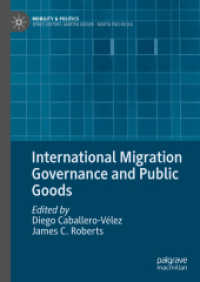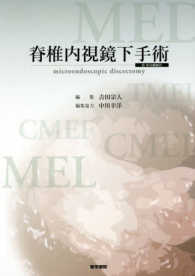- ホーム
- > 洋書
- > ドイツ書
- > Humanities, Arts & Music
- > Arts
Description
(Text)
Bracha Lichtenberg Ettinger, kurz BRACHA (geb. 1948 in Tel Aviv; lebt und arbeitet in Tel Aviv und Paris) ist Malerin, Psychoanalytikerin, Philosophin und Friedensaktivistin. Während ihre Theorie des matrixialen Blicks in Kunst und Wissenschaft breit rezipiert wird und ihre Werke international gesammelt und besprochen werden, fand BRACHA in Deutschland erst infolge ihres Rücktritts aus der Findungskommission zur künstlerischen Leitung der documenta 16 breite Beachtung - auch weil die Tochter von Holocaust-Überlebenden sich 40 Jahre lang nicht in der Lage sah, in Deutschland auszustellen. Früh setzte BRACHA den Fotokopierer als Mittel der Bildfindung ein, mischte Asche in Pigmente und befragte zeitgeschichtliche Dokumente des Massenmords auf ihre Abbildbarkeit: In ihren Gemälden begegnen weibliche Opfer der Shoah Frauenfiguren aus antiken Mythen. Ihr ethisches und ästhetisches Programm eröffnet neue Räume für Zwischenmenschlichkeit, Mitgefühl und Offenheit gegenüber unserer Zukunft.
Anlässlich ihrer ersten institutionellen Einzelausstellung in Deutschland erscheint diese Publikation, die einen Überblick über BRACHAs bahnbrechendes Werk gibt. Neueste Malereien stehen ihrem Frühwerk aus den 1980er-Jahren gegenüber und Ausschnitte aus den mannigfaltigen Notizbüchern verdeutlichen, wie die Künstlerin in Zeichnungen und Tuschemalerei das Zeitgeschehen kommentiert. Mit einem Vorwort von Susanne Gaensheimer, Essays von Kolja Reichert und der Künstlerin sowie Textfragmenten von Nicolas Bourriaud, Christine Buci-Glucksmann, Rosi Huhn, Jean-François Lyotard, Brian Massumi und Griselda Pollock.
Insights into the Vulnerability of Existence
Bracha Lichtenberg Ettinger, BRACHA for short (b. Tel Aviv, 1948; lives and works in Tel Aviv and Paris), is a painter, psychoanalyst, philosopher, and peace activist. Her theory of the matrixial gaze has attracted considerable attention from the art world and academia, and her work has been discussed in the international press and is held by collections in numerous countries. In Germany, however, BRACHA was largely unknown-in part because, as a daughter of Holocaust survivors, she had found it impossible for forty years to exhibit her work in the country-until she stepped down from the finding committee for the artistic direction of documenta 16. BRACHA was an early adopter of the photocopier as a compositional tool, mixed ashes with pigments, and interrogated documents that provided evidence of the mass murder with a view to their representability: in her paintings, women victims of the Shoah encounter female figures from ancient myth. Her ethical and aesthetic program opens up new spaces for interpersonal relations, compassion, and openness to our future.
Released on occasion of BRACHA's first institutional exhibition in Germany at Kunstsammlung Nordrhein Westfalen, this publication presents a survey of her groundbreaking oeuvre. Her most recent paintings appear side by side with her early works from the 1980s, and selections from her manifold notebooks illustrate how the artist records her observations on current affairs in drawings and ink paintings. With a foreword by Susanne Gaensheimer, essays by Kolja Reichert and the artist as well as text fragments by Nicolas Bourriaud, Christine Buci-Glucksmann, Rosi Huhn, Jean-François Lyotard, Brian Massumi, and Griselda Pollock.







